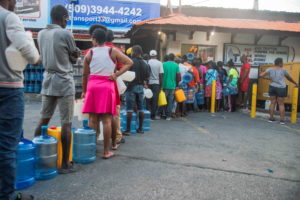Port-au-Prince, Feb 14 (EFE).- The political and economic crisis in Haiti continues to worsen on Thursday, eight days after violent protests began against the government of the country’s president, Jovenel Moise, who remains silent.
The protests began on Feb. 7, coinciding with the second anniversary of Moise’s rise to power, whose resignation the protesters demand on the streets of Port-au-Prince and other cities in the impoverished Caribbean country.
Many people have taken to the streets in search of water and food, amid a tense calm, while the promoters of the protests have warned that they will continue, but on Thursday no major protests have started by early afternoon.

The capital, Port-au-Prince, remains paralyzed with schools and banks closed, as well as many businesses and petrol stations, which fear more looting like those that have occurred in the early days of the protests, in which at least nine people have died.
Transport in the capital remains precarious, with only motorcycles providing service, while the streets connecting Port-au-Prince and six other departments are blocked.
“I need water for my children and today I will try to find water to survive,” Carol Milien told EFE, who said she has already depleted the water she had stored.
The woman said it is “very serious what is happening in the country” and that the poor “are the one who suffers the most.”
“I have no hope that these politicians will do anything for me or the country,” Milien said resignedly.
While people are in the streets are desperate for food and water, the president has remained silent since Fb. 9 when he called for dialogue, which was rejected by the leaders of the protests made up of opposition parties and popular groups.
At a press conference, Senate President Carl Murat Cantave on Thursday urged Moise and his prime minister, Jean Henry Ceant, to speak to the nation while calling for dialogue to resolve the crisis.
“Today we are in a moment of crisis and we have to lead, the president and the prime minister have to talk to the country,” he said, noting that “after a week of crisis the country needs responsible leaders.”
“We have to act responsibly in these difficult times,” the senator said.
Meanwhile, human rights organizations have warned of the precariousness of hospitals to treat those injured in the riots.
The violence in the streets as a result of the demonstrations has forced some embassies to temporarily suspend some services.
The protests, which have increased insecurity in this Caribbean nation and caused a climate of chaos and uncertainty, are taking place amid a severe economic crisis, aggravated this year by a sharp depreciation of the gourde, the official currency, and by the electricity crisis resulting from the shortage of gasoline.
